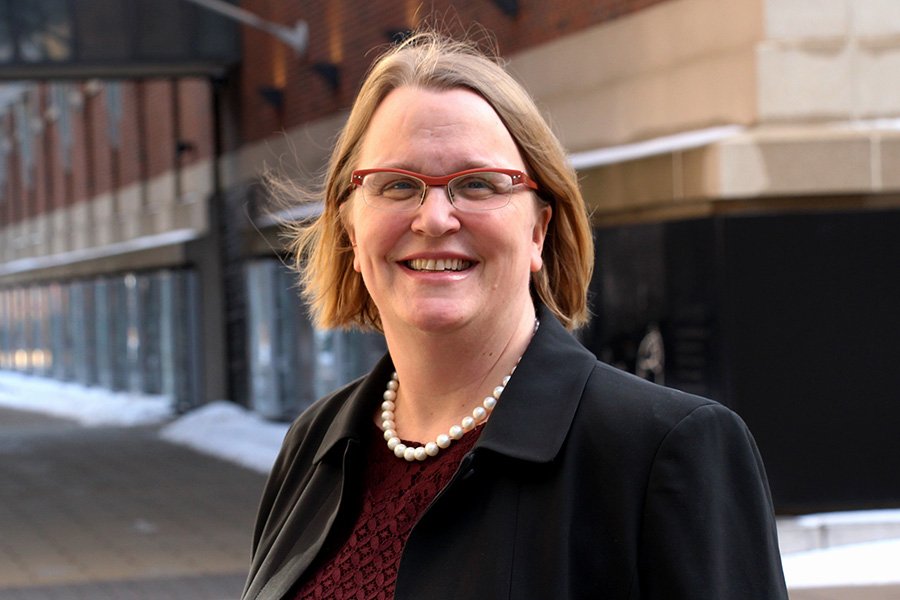Q&A with Allison Hubel, the first woman director of TLI

CSE professor shares her vision for the institute
March 16, 2021
Allison Hubel is used to being a trailblazer in her field. She’s pioneering the use of low-temperature Raman Spectroscopy to understand what happens to cells during freezing. She has developed revolutionary methods of preserving cells using naturally occurring molecules. Her startup company, BlueCube Bio, won the 2020 MN Cup, a statewide entrepreneurial competition.
Now Hubel, a professor in the Department of Mechanical Engineering at the University of Minnesota, is the first woman appointed to direct the College of Science and Engineering’s Technological Leadership Institute (TLI). The interdisciplinary center located in the McNamara Alumni Center on the Twin Cities campus was founded in 1987 with an endowment from the Honeywell Foundation. It offers professional development programs and seminars, in addition to undergraduate and graduate degree programs.
We sat down with Hubel over Zoom to discuss her plans for TLI and what it means to her to be its first woman director.
What drew you to TLI in the first place?
TLI is in many ways a bridge between the university and its alumni because we provide a lot of ongoing education for people who are out in industry and who are interested in technology intensive industries. That education involves enhancing leadership skills, and it also helps you understand how new technology—and technology is changing very rapidly—gets integrated into industry. It's interesting to me because I am a firm believer and have always been involved in professional development.
My personal philosophy is that you're never done enhancing your skills and developing yourself as a professional.
You’re the first woman to be named director of TLI in its 35-year history. What does that mean to you to be in that pioneer role?
Well, I’m a woman mechanical engineer. Basically, it’s 20 percent women, 80 percent men in the field. For my entire career, I’ve gotten used to being a unicorn. My hope would be that my role can be enhanced by my ability to look at things through the female lens and add to the organization. Diverse organizations are more resilient, the governance is more stable, and they are more innovative. So, it's not only my views but also enhancing the diversity of TLI as a whole that will result in an organization that is more innovative, more resilient, and more equitable. I am hopefully just one component in what will be a growing diversity, and that diversity will strengthen TLI.
What is your vision for TLI? What are some things you’d like to do with this position?
My personal philosophy is that professional development is lifelong, so we need to make sure we have programs that meet the needs of people all along their career paths. For our students in the workplace, we need to be figuring out how to develop short courses or certificate programs that help them refresh their skills, remain relevant and important to their employers, or allow them to adapt if there is a shift in their career trajectory. Not everyone is going to go to work for 3M or Honeywell or Boston Scientific. Each workplace has different requirements. So, how can we help people navigate those differences and be valuable in whatever context they should choose to be?
Entrepreneurship is also of great interest to me, and there has been a tremendous investment at the University of Minnesota to foster entrepreneurship in its faculty and students. TLI should be a cheerleader, a strong supporter, and a program developer that helps continue that investment and make it fruitful.
What do you think you bring to the position?
My entrepreneurial experience really helps me understand the importance of market pull for the development of these programs. I think that my experiences in professional development are also important. I have been very involved in the Big 10 Women's Workshop, which is a networking and mentoring workshop for women engineering faculty in the Big 10, for well over a decade. I also have my own short course at the University of Minnesota’s Biopreservation Core Resource (BioCoR), so I am used to developing material for adult learners marketing it implementing it and making it successful.
For you, what is the importance of having more women in leadership positions in the college and university?
I think it's important to say that diversity in membership and in leadership is important for any institution. We will not meet the needs of society for engineers and scientists unless we are able to recruit women and people of color into the fields.
We just simply can't. We cannot rely on one group of white men for our programs, and that's only going to accelerate with time. You bring with you those different lenses that allow you to develop and foster an atmosphere of innovation, of rigorous and strong governance, and of resilience. Those different lenses help create an organization that is more powerful. To that extent, I think women and any underrepresented groups are important.
Read our news release announcing Hubel’s appointment.
Learn more about the Technological Leadership Institute.
Interview by Olivia Hultgren
